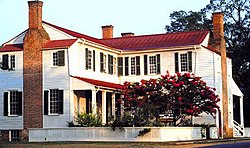Hanover Tavern
|
Hanover Tavern
|
|

A view looking across Route 301 from the courthouse green to the Hanover Tavern. Patrick Henry stayed at a predecessor tavern when he argued his famous Parson's Cause at the Hanover Courthouse.
|
|
| Nearest city | Hanover, Virginia |
|---|---|
| Coordinates | 37°45′43″N 77°22′1″W / 37.76194°N 77.36694°WCoordinates: 37°45′43″N 77°22′1″W / 37.76194°N 77.36694°W |
| Part of |
Hanover County Courthouse Historic District (#71000980 ) |
| Designated CP | September 22, 1971 |
Hanover County Courthouse Historic District (#71000980
The Hanover Tavern in Hanover Courthouse, Virginia and Hanover County, Virginia, is one of the oldest taverns in the United States.
The first tavern was licensed at the site beginning in 1733. Hanover Tavern has been serving county courthouse users, residents, travelers, and stagecoach passengers ever since. Court would convene once per month, with judges and patrons travelling long distances to conduct business. Travelers needed an inn to provide meeting space, food, drink, and overnight stay as well as stables and food for the teams, horses, and mules.
The Hanover County Courthouse is an operating courthouse, the third oldest still in use in the United States. Located along what is now historic U.S. Route 301, its site was adjacent to the original Shelton Tavern. Hanover County’s greatest native son, Patrick Henry, married Sarah Shelton, the daughter of John & Eleanor Parks Shelton, the owners of the Tavern from 1750–1764. Henry assisted his father-in-law by greeting and serving guests, tending bar, and entertaining with his fiddle playing and warm personality. Working at the tavern exposed Henry to the legal world and in April 1760 at the age of 24, he obtained a license to practice law.
Patrick Henry’s great oratory skills and patriotic fervor were first recognized on December 1, 1763, when he delivered an impassioned speech during the damages phase of the Parson’s Cause case. Across the street at Hanover Courthouse, he was the first to publicly challenge the authority of the King and question the true motives of the clergy representing the Church of England. This was one of the first signs of the revolutionary spirit growing in America.
During the Revolutionary War, French officers Marquis de Lafayette, Marquis de Chastellux, and Rochambeau all enjoyed the hospitality of Tavern owner Paul Thilman. Chastellux referred to the tavern as a “Tolerable handsome inn, with a large salon and covered portico”. In his diary, General George Washington twice refers to dining and lodging at Hanover Courthouse.
The Civil War turned the Tavern into a home for refugees, fleeing the Union Army. Two such boarders were Margaret Wight and her husband John. While living at the Tavern, Margaret kept a diary, reporting on such things as news of the war, worries about her children, occurrences at the Tavern, and the price of food and clothing. In the opening paragraph of the diary, Margaret refers to the war as “this most unhappy contest, which is now at its height, between the two sections of our once happy country”.
...
Wikipedia


